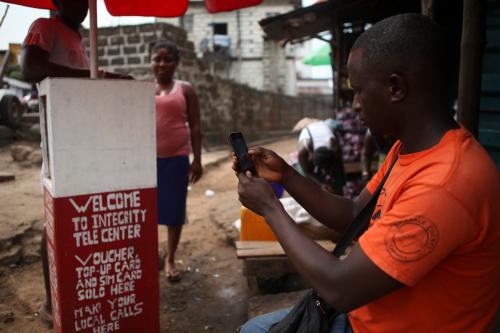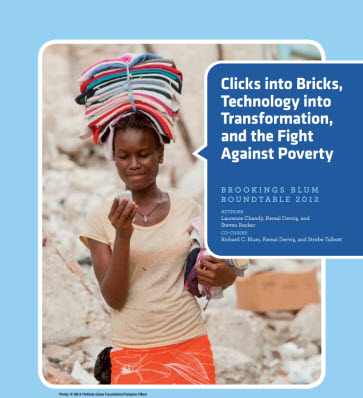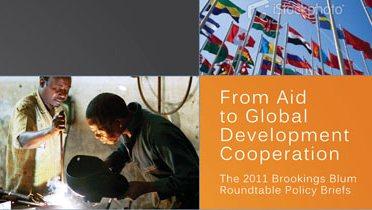

Past Event
On August 1-3, 2012, Brookings Global Economy and Development hosted the ninth annual Brookings Blum Roundtable on Global Poverty in Aspen, Colorado. The year’s roundtable theme, “Innovation and Technology for Development”, brought together global leaders, entrepreneurs and practioners to discuss how technology and innovation can be seized to help solve some of the world’s most pressing global development challenges.
| 2012 Brookings Blum Roundtable: Related Materials | |
 |
|
Global development challenges are of massive scale: 61 million children out of school and many more failing to learn basic literacy and numeracy skills; 850 million facing hunger; 1 billion living in slums and 1.3 billion without access to electricity. Yet remarkably little is understood about successful strategies for designing scalable solutions, the impediments to reaching scale, or the most appropriate pathways for getting there.
However, a batch of new technologies offers the promise of a breakthrough by encouraging innovative business models, pushing down transaction costs and disintermediating complex activities. Mobile money could realistically reach over 1 billion poor people in the next decade and directly connect millions of rich individuals with millions of poor people. Real-time data can allow resources to be better targeted and managed. New media can sharpen accountability and reduce waste and overlap.
Roundtable Agenda
Wednesday, August 1, 2012
Welcome: 8:40AM – 9:00AM
Brookings Welcome
• Strobe Talbott, Brookings
Opening Remarks
• Richard C. Blum, Blum Capital Partners, LP and Founder of the Blum Center for Developing Economies at Berkeley
• Mark Suzman, Bill and Melinda Gates Foundation
• Kemal Derviş, Global Economy and Development, Brookings
Session I: 9:00AM – 10:30AM
Framing Session: Translating Technological Innovations into Transformational Impact
In this opening discussion, participants will explore the overarching questions for the roundtable: If the poor can readily be identified and if they have access to financial services and participate in technology-driven communication networks, how does this change the development paradigm? How can effective partnerships be forged to combine the efforts of different international and local actors (businesses, governments, foundations, NGOs, and universities) in propagating solutions? Can scalable technologies raise the profile and potential of new business models, approaches and partnerships?
Moderator
• Homi Kharas, Brookings
Introductory Remarks
• Thomas A. Kalil, White House Office of Science and Technology
• Michael Kubzansky, Monitor Group
• Lalitesh Katragadda, Google India
• Smita Singh, Independent
Session II: 10:50AM – 12:20PM
Mobile Money and Mass Payments
Participants will explore the following questions for the rountable: Is the rapid uptake of mobile money/payment technology throughout the developing world assured and if not, what (or whom) are the impediments? What is required to enable successful mass payments systems that employ mobile money technology? What is the optimal role of government, non-profits and private actors in supporting mobile money services? How can mass payments systems be used to implement national safety nets?
Moderator
• Gillian Tett, Financial Times
Introductory Remarks
• Neal Keny-Guyer, Mercy Corps
• Mwangi Kimenyi, Brookings
• Mung Ki Woo, MasterCard Worldwide Group Executive Mobile
Dinner Program: 7:30PM – 9:15PM
Aspen Institute Madeleine K. Albright Global Development Lecture
Featuring
• Rajiv Shah, Administrator, United States Agency for International Development
Click here to read Rajiv Shah’s remarks »
Thursday, August 2, 2012
Session III: 9:00AM – 10:30AM
Mass Networks: Leveraging Information from the Crowd
Participants will explore the following questions for the rountable: What are the most promising examples of using social media, crowdsourcing and “big data” to advance development and humanitarian outcomes? How can traditional foreign assistance make use of virtual networks to support transparency, democratic governance and improved service delivery? How can technologies be used to understand clients, promote beneficiary feedback and learning to fine tune business models in base of the pyramid markets?
Moderator
• Walter Isaacson, Aspen Institute
Introductory Remarks
• Anne-Marie Slaughter, Princeton University
• Juliana Rotich, Ushahidi
• Robert Kirkpatrick, UN Global Pulse Initiative
• Rakesh Rajani, Twaweza
Session IV: 10:50AM – 12:20PM
Innovation and Technology for Green Growth
Participants will explore the following questions for the rountable: How advanced is green growth technology vis-à-vis the scale and urgency of the global climate challenge? What is the role of pricing and intellectual property and push and pull mechanisms in speeding up propagation within developed and developing markets? How can the goal of “sustainable energy for all” be achieved, and is it feasible in all countries?
Moderator
• Al Gore, The Climate Reality Project
Introductory Remarks
• Mary Robinson, Mary Robinson Foundation – Climate Justice
• Helen Clark, United Nations Development Programme
• Arthur Njagi, International Finance Corporation
• Viswanathan Shankar, Standard Chartered Bank
Lunch Program: 12:30PM – 2:00PM
Partnering with Academic Research Institutions
This discussion will explore partnerships between public sector development institutions and academic research institutions to support global development goals. Topics will include the constraints to research; how to make research more relevant to developing country problems; issues around incentives for scientists and universities; and relationships between universities, financiers and implementers.
Moderator
• Javier Solana, ESADE
Panel
• Richard C. Blum, Blum Capital Partners, LP and Founder of the Blum Center for Developing Economies at Berkeley
• Luis Alberto Moreno, Inter-American Development Bank
• Shankar Sastry, University of California, Berkeley
• Alex Deghan, United States Agency for International Development
Friday, August 3, 2012
Session V: 9:00AM – 10:30AM
Business Solutions and Private Sector Development
Participants will explore the following questions for the rountable: What role can the new breed of socially conscious private actors (e.g., social enterprises and impact investors) play in overcoming finance and delivery constraints and scaling up development impact? Where is the need for investment finance most acute, and who or what can fill these gaps? How are management approaches evolving to suit base of the pyramid markets? What are the impediments to the adoption or adaptation of scalable technologies by developing country enterprises, and are southern innovations being efficiently spread? What is constraining private sector development in Africa, and is technology a key bottleneck?
Moderator
• Laura Tyson, University of California, Berkeley
Introductory Remarks
• Rob Mosbacher, Mosbacher Energy Company
• Mathews Chikaonda, Press Corporation Limited
• Elizabeth Littlefield, Overseas Private Investment Corporation
• Amy Klement, Omidyar Network
Session VI: 10:50AM – 12:20PM
Delivering U.S. Leadership: Role for the Public Sector
Participants will explore the following questions for the rountable: What is an appropriate role for the U.S. government in promoting technological solutions for development and scaling these up? How should the government leverage new private sector players? What are the best examples of, and lessons learned from, earlier and on-going public private partnerships? How can the U.S. government work more effectively to support local innovation and technology in developing countries?
Moderator
• Sylvia Burwell, Walmart Foundation
Introductory Remarks
• Rajiv Shah, Administrator, United States Agency for International Development
• Sam Worthington, InterAction
• Henrietta Fore, Holsman International
Closing Remarks: 12:20PM – 12:30PM
• Richard C. Blum, Blum Capital Partners, LP and Founder of the Blum Center for Developing Economies at Berkeley
• Kemal Derviş, Global Economy and Development, Brookings
Lunch Program: 12:30PM – 2:00PM
A Conversation with Michael Froman and Thomas Nides
This conversation will focus on the politics and finance of the US government’s efforts on global development, including its specific initiatives regarding technology and innovation for development.
Moderator
• Madeleine K. Albright, Albright Stronebridge Group
Live Webcast Event: 4:00PM – 5:30PM
Brookings and the Aspen Institute Present: “A Conversation with Former World Bank President Robert Zoellick“
Global Economy and Development at Brookings and the Aspen Strategy Group will host Robert Zoellick, who recently stepped down as president of the World Bank after serving in that office for the past five years. Mr. Zoellick has held several senior positions in the U.S. Government, including deputy secretary of state and U.S. trade representative under President George W. Bush. This event will be webcast live on the Brookings website. Click here for more details.
Introduction
• R. Nicholas Burns, Director, Aspen Strategy Group and Professor of the Practice of Diplomacy and International Politics, Harvard Kennedy School of Government
Moderator
• Strobe Talbott, President, Brookings
Related Content

Kemal Derviş, Laurence Chandy, Steven Rocker
February 12, 2013
2012
Live Webcast
Friday, 6:00 pm - 7:30 pm EDT

September 8, 2011

Mark-Alexandre Doumba
February 10, 2026

Vera Songwe
February 3, 2026

Miranda Bogen, Cameron F. Kerry, Karen Kornbluh, Joshua P. Meltzer, Marcel Mir Teijeiro, Enkhjin Munkhbayar, Nitya Nadgir, Elham Tabassi, Brooke Tanner, Valerie Wirtschafter +5 more
January 21, 2026